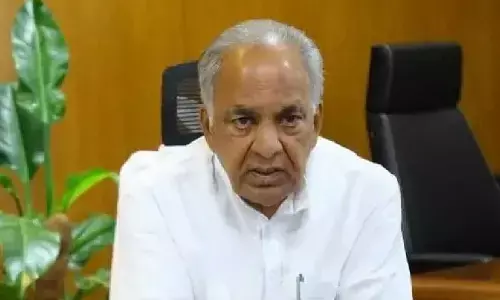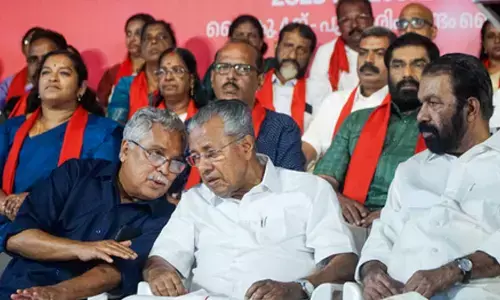Galaxy Note8 sales beat iPhone 8

Samsung Galaxy Note8 that came to India last month and saw over 250,000 registrations within no time is selling like hot cakes and has left Apple iPhone 8 and 8 Plus behind in the race at the moment, industry sources said on Wednesday.
Samsung Galaxy Note8 that came to India last month and saw over 250,000 registrations within no time is selling like hot cakes and has left Apple iPhone 8 and 8 Plus behind in the race at the moment, industry sources said on Wednesday.
According to dealers, Galaxy Note8 sales are ahead when compared to iPhone8 and 8 Plus. "For every 100 Galaxy Note8 being purchased, 60-70 iPhone8 and iPhone 8 Plus are being sold," a south Delhi-based dealer told IANS on the condition of anonymity.
According to Tarun Pathak, Associate Director, Mobile Devices and Ecosystems, Counterpoint Research, the fight between Note8 and IPhone8 is finally going to be pretty close.
"We are looking at a neck-to-neck fight. What changes iPhone X will make to the scenario is yet to be seen but at the moment, Note8 is doing good in India and Apple users are waiting for iPhone X to arrive," Pathak told IANS.
Indian smartphone users have reiterated that lack of innovation, coupled with high prices of iPhone devices, stopped them from buying iPhone8 and 8Plus.
The iPhone 8 64GB costs Rs 64,000 while the 256GB variant will be available for Rs 77,000. The iPhone 8 Plus starts at Rs 73,000 for 64GB while the 256GB variant will cost Indian users Rs 86,000.
The iPhone X, which marks the 10th anniversary of the device, will be launched in India on November 3 and cost the users Rs 89,000 (64 GB model) and Rs 1.02 lakh (256 GB).
People, who converged at several Apple reseller stores in the Delhi-NCR region after the new Apple flagships were made available in the country on September 29, were put off by "no or less innovation".
"I am not buying iPhone 8. It has got a hefty price tag with no or less innovation. It is not a value-for-money product," Sidharath Arya, who came to check the latest iPhones at iWorld in Kamla Nagar in North Delhi, said.
Gaurav Sharma said he would not buy an iPhone 8 because "even Apple is not sure of its innovation in this device". "Apple made iPhone 8 obsolete in a matter of minutes by announcing ultra-expensive iPhone X.
The A11 Bionic chip is powerful, but Apple, known for its innovation, has not done anything great in the latest flgaship. There are several other factors that pursue people to buy a device. The iPhone 8 doesn't have them," he added.
Talking about the price, Abhishek Singh, who works as an engineer, told IANS that he was disappointed when he saw the prices of the new devices.
"Had Apple launched iPhone 8 and iPhone 8 Plus with 'Super Retina' display, I would have bought it on the first day. Instead they chose to incorporate the 'innovation' in highly-priced iPhone X, which is beyond reach of several iPhone lovers," Singh added.
Meanwhile, Samsung India is consolidating its leadership in India -- with its market share (in terms of value) rising from 43 per cent in July to 46 per cent in August, according to the latest report from the market research firm GfK.
When it comes to the premium segment in India, Samsung already rules the market with over 60 per cent share in India. In the January-June quarter of 2017, Apple sold 3,00,428 units of iPhone 7 and 2,06,292 units of iPhone 7 Plus.
However, Samsung surged ahead and sold 122,000 units of S8 and 140,000 S8 Plus -- which were launched in India only in April this year -- according to the recent data provided by CyberMedia Research.
According to Asim Warsi, Senior Vice President, Mobile Business, Samsung India, the company is looking to beat industry growth rate of 25-30 per cent in the ongoing festive season.
The company expects to post record sales this year on the back of its strong performance in the smartphone business. Samsung makes all its smartphones at its Noida factory. It recently invested around Rs. 5,000 crore in the Noida factory to double capacity.











